What is Attitude?
Attitude is defined as a more or less stable set of predispositions of opinion, interest or purpose involving expectancy of a certain kind of experience and readiness with an appropriate response.
Attitudes are also known as “frames of reference“. They provide the background against which facts and events are viewed.
Table of Content
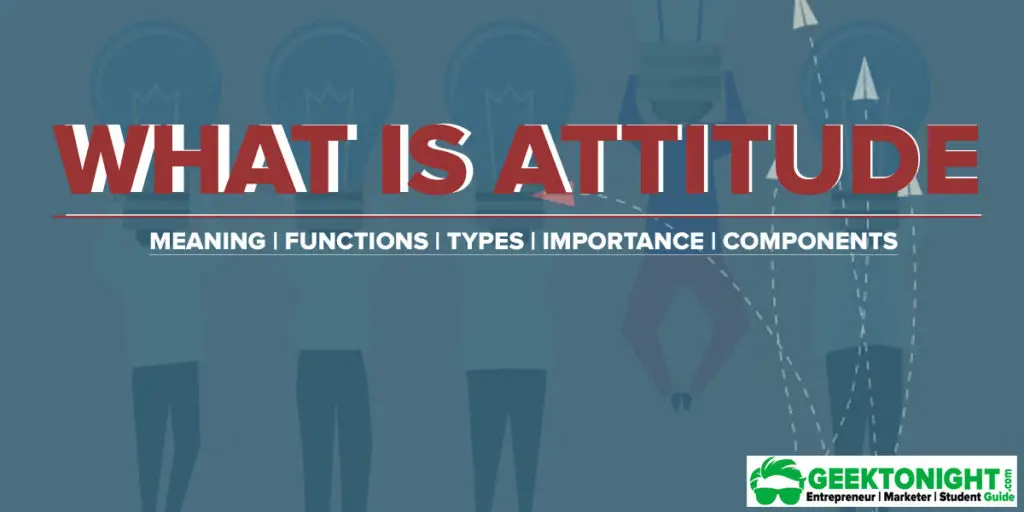
An attitude describes persons’ enduring favorable or unfavorable cognitive evaluations, feelings, and action tendencies toward some object or idea. People have attitudes regarding almost everything such as religion, politics, cloth, music, food.
A person’s attitudes settle into a coherent pattern and to change one may require difficult adjustment in many others. Thus, a company would be well advised to fit its product into existing attitudes rather than to try changing people’s attitude.
Attitude can be defined as learnt predispositions to respond to an object or class of objects in a consistently favorable or unfavourable way.
Attitude Definition
Attitudes are evaluation statements either favourable or unfavourable or unfavourable concerning objects, people or events. They reflect how one feels about something.
Robbins
Attitude is a mental and neutral state of readiness organized through experience, exerting a directive or dynamic influence upon individual’s response to all objects and situations with which it is related.
G.W. Allport
Attitude as an enduring organization of motivational, emotional, perceptual and cognitive processes with respect to some aspect of the individual’s world.
Krech and Crutchfield
Attitude is a tendency or predisposition to evaluate an object or symbol of that object in a certain way.
Katz and Scotland
Attitude Meaning
In simple words, an “attitude” is an individual’s way of looking or an individual’s point of view at something.
To be more specific, an “attitude” may be defined as the mental state of an individual, which prepares him to react or make him behave in a particular pre-determined way. It is actually an acquired feeling.
Attitude is the mixture of beliefs and feelings that people have about situations, specific ideas or other people.
Also Read: What is Organizational Behavior? | Organizational Behavior Definition
Components of Attitude
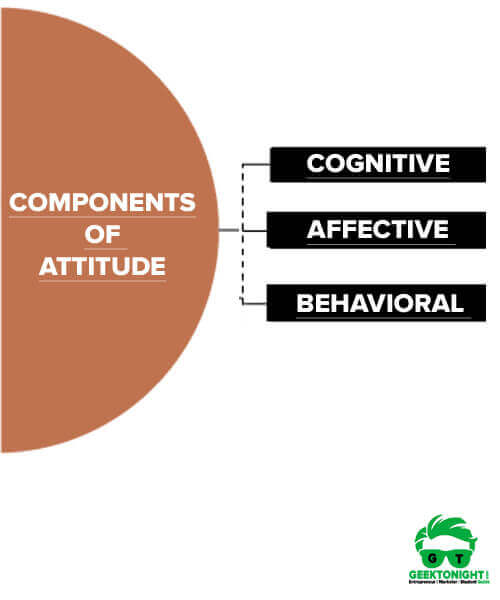
Cognitive component
Beliefs are the cognitive components of consumer attitude. Cognitive component of attitude is associated with the value statement. It consists of values, belief, ideas and other information that a person may have faith in.
Positive brand associations enhance brand equity and are achieved through a number of positioning strategies. Through brand associations, marketers establish and influence favorable beliefs about a brand and unfavorable beliefs about competitors.
Example: Quality of sincere hard is a faith or value statement that a manager may have.
Affective component
Affective is the emotive component of consumer attitude. Affective component of attitude is associated with individual feelings about another person, which may be positive, neutral or negative.
Three research models describe the determinants of affective response.
- Functional theory of attitude explains that consumers buy as a result of one of four psychological functions: adjustment, ego defense, value expression, and application of prior knowledge.
- Fishbein model relates consumer beliefs and evaluations to affective response: if beliefs are strong and desirable, affective responses are positive.
- Belief importance model analyses affective responses across competing brands.
Example: I don’t like Sam because he is not honest, or I like Sam because he is sincere. It is an expression of feelings about a person, object or a situation.
Behavioral component
Intention is the behavioral component of consumer attitude. Behavioral component of attitude is associated with the impact of various condition or situations that lead to person behavior based on cognitive and affective components.
Two research models demonstrate the relationship between intention to purchase and actual purchase and consumption.
- The theories of reasoned action explain purchasing behavior as a direct result of intention, influenced by attitude toward purchase and by subjective norms.
- The theory of trying to consume explains actual consumption behavior of purchasers. It provides insight into the establishment and maintenance of long-term relationship with consumers.
Example: I don’t like Sam because he is not honest is an affective component, I, therefore, would like to disassociate myself with him, is a behavioural component and therefore I would avoid Sam.
Cognitive and affective components are bases for such behaviour. Former two components cannot be seen, only the behaviour component can be seen. Former is important because it is a base for the formation of attitude.
Also Read: Vroom’s Expectancy Theory of Motivation
Characteristics of Attitude
Characteristics of attitude are discussed below:
- Attitude are predispositions
- Attitude are different from values
- Attitude are evaluative statement
- Attitude influence human behavior
- Attitude have intensity
- Attitude are learnt
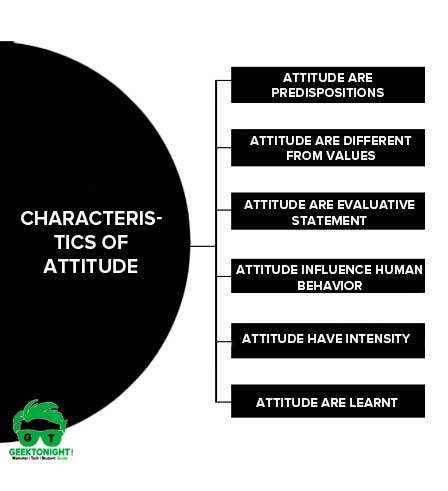
Attitude are predispositions
Attitude are predispositions of purpose, interest or opinion of the person to assess some objects in a favourable or an unfavourable manner.
Attitude are different from values
Attitude are different from values: Values are the ideals, whereas attitudes are narrow, they are our feelings.
Attitude are evaluative statement
Attitude are evaluative statements: either favourable or unfavourable concerning the objects, people or events.
Attitude influence human behavior
A positive attitude towards a thing will influence human behavior towards the thing favorably and vice-versa.
Attitude have intensity
It refers to the strength of the effective component. For example, we may dislike an individual but the extent of our disliking would determine the intensity of our attitude towards the person.
Attitude are learnt
Attitude is not inborn phenomenon. Attitude are learnt through social interaction and experience.
Functions of Attitude
Four important functions of attitude which are crucial in organizational behavior viewpoint are:
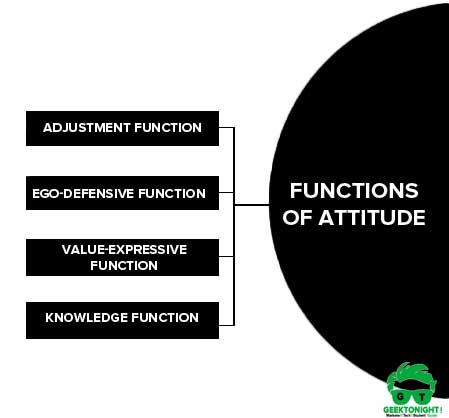
Adjustment Function
Attitudes often help individuals to adjust to their work environment.
Consumers hold certain brand attitudes partly because of the brand utility. If a product has helped us in the past even in a small way, our attitude towards it tends to be favorable. One way of changing attitude in favor of a product is by showing people that it can solve utilitarian goals. They may not have considered some advertisement which stresses the utilitarian benefits of a product.
Example: Well-treated employees tend to develop a positive attitude towards their management or job.
Ego-Defensive Function
Consumers want to protect their self concept from inner feelings of doubt. Cosmetic and personal hygiene products, by acknowledging this need, increase their relevance to the consumer and have the possibility of a favorable attitude by offering reassurance to the consumers self concept.
Example: Older faculty might feel somewhat threatened by a young and new faculty member who is full of fresh ideas and enthusiasm
Value-Expressive Function
Attitudes are one expression of general values, lifestyles, and outlook. If a consumer segment generally holds a positive attitude towards being in a fashion segment, consumer may treat high fashion clothing and accessories as symbols of that lifestyle.
Example, a manager who values honest and sincere work will be more vocal against an employee who is having a very casual approach towards work.
Knowledge Function
Attitudes provide frames of reference or standard that allow individuals to understand and perceive the world around him. Individuals have a strong need to know and understand the people and things with whom they come in contact, especially if they think they might influence their behavior.
Example, If a student has a strong negative attitude towards the college, whatever the college does, the student will be perceived as something ‘bad’ and as actually against them.
Also Read: What is Motivation? | Types of Motivation
Types of Attitude
There are broadly three types of attitude in term of organisational behavior
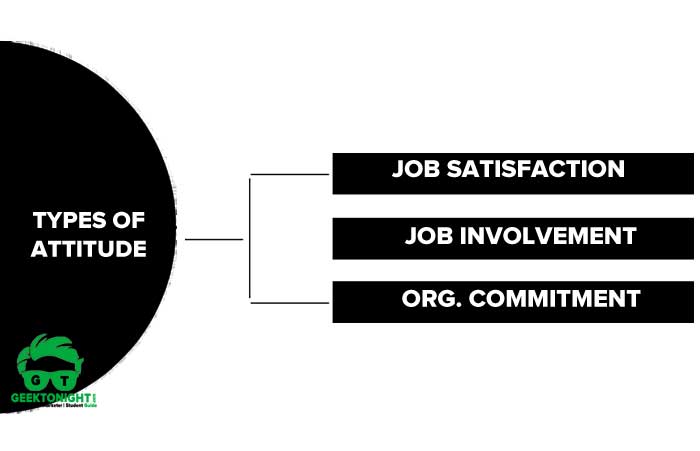
Job satisfaction
A collection of positive and/or negative feelings that an individual holds toward his or her job.
A person will hold a positive attitude if had a high level of satisfaction, while dissatisfied people will generally display a negative attitude towards life.
When we talk about attitude, we generally speak about job satisfaction because they are inter-related in organizational behaviour.
Job involvement
Job involvement refers to the degree to which a person identifies himself (psychologically) with his job, actively participates and considers his perceived performance level important to self-worth. (Robbins)
Higher job satisfaction leads to low absenteeism & employee turnover and indicates that the individual cares for his job.
Organizational commitment
Organizational commitment refers to a degree to which an employee identifies himself with the organizational goals and wishes to maintain membership in the organization.
Resigning from the job or absenting versus job satisfaction is a predictor of organizational commitment. Organizational commitment depends upon the degree of autonomy & freedom job and job enrichment factor.
Also Read: What is Perception? | Importance of Perception
Attitude Formation
The question often arises, ‘how are the attitudes and subsequent behaviors formed?’ While attitudes are basically learned over the years, some inherited characteristics do affect such attitudes
Some of the learned characteristics responsible for attitude formation are:
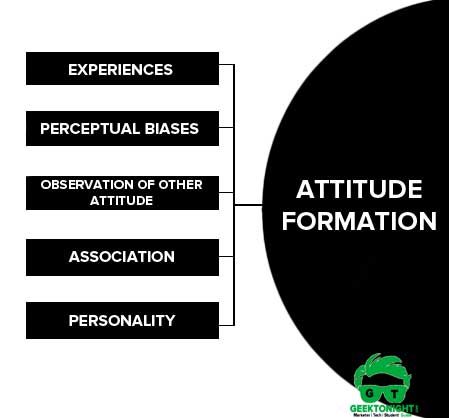
Experiences
Our personal experiences with people and situations develop our attitude towards such persons and situations.
Through job experience, people develop attitudes towards working conditions, salaries, supervision, group dynamics and so on.
Perceptual biases
Perception is the result of a complex interaction of various senses such as feelings, seeing, hearing and so on and plays an important part in our attitude and behavioural formation.
For example, if a manager perceives a subordinate’s ability as limited, he will give him limited responsibility. Similarly, we lose many good friends due to our changed perception about them.
Observation of other person attitude
When we like someone, we try to emulate that person’s attitude.
For example, when we are impressed by someone keeping calm under stressful circumstances and we appreciate such calmness, we might try to do the same.
Association
Our association with the group we belong to strongly influences our attitude. Our close association with a group would encourage us to be consistent with the attitude of the group.
Personality
Personality is a set of traits and characteristics, habit patterns and conditioned responses to certain stimuli that formulate the impression that a person makes upon others and this impression is a function of a person’s attitude.
Consumer Attitude Formation
Attitudes are learned though there are different approaches on how learning works as is acquired by individuals. Following factors lead to consumer attitude formation:
- Economic Factors
- Family Factors
- Social Factors
- Political Factors
- Psychological Factors
- Personality Factors
- Reference Group Factors
Read Complete Article: Consumer Attitude Formation
Importance of Attitude
An expert knows that a positive attitude is necessary for successful completion of a project or an assigned task. Having a positive attitude with positive thinking in the organization will reflect on what employee do and make them a more productive employee.
Importance of attitude in organisational behavior
Employees with a positive attitude will create a healthy atmosphere in the organization, develop positive relations with sub-ordinates, their supervisors, managers and top management. A positive attitude has significant benefits for an individual in many aspects.
Following are the aspects related to the importance of attitude:
- Career success
- Productivity
- Leadership
- Teamwork
- Decision making
- Motivation
- Interpersonal relations
- Stress management
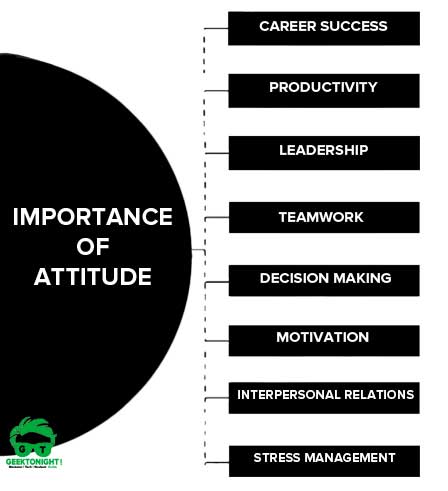
Career success
Performance is a parameter to measure employees‘ success in the workplace. Performance leads to success either through promotion or increased compensation. A positive attitude of an employee will help him to think of ways to accomplish their task in a well-defined manner
Productivity
An employee with a positive attitude tends to take more interest and responsibility and will provide better work, which in turn will improve productivity.
Leadership
Managing a diverse workforce is a crucial task for achieving the objective of an organization. Positive attitude demonstrated by leaders or employee will result in proper communication between the subordinate which will lead to efficient work.
Teamwork
A positive attitude of employees helps to appreciate each other‘s competencies and work as a team for achieving common objectives.
Decision making
An employee with a positive attitude and mindset will help employees to make better decisions, in an objective manner. It will enable employees to choose wisely and logically and avoid them to take an unambiguous decision.
Motivation
Motivation is an important factor for efficient work. An employee with a positive attitude will always be mentally prepared to face any obstacle in a job. The moment they are successful in overcoming obstacles, they are motivated to move forward.
Interpersonal relations
Customers prefer to make relation with someone who is positive in nature. A positive attitude helps in establishing valuable customer loyalty.
Stress management
Positive attitude and thinking will reduce the stress of an employee and with reduced stress employee can take a better decision and increase their productivity which results, employees, to enjoy better health and take fewer sick leaves.
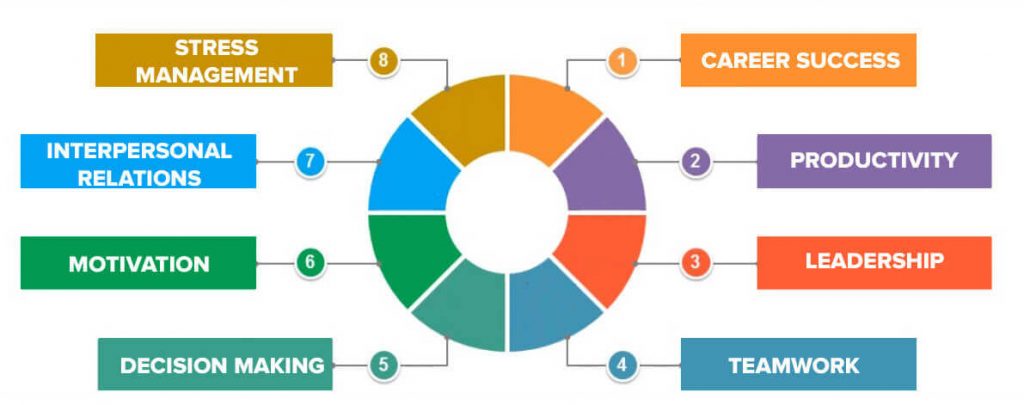
Also Read: What is Learning? | Elements of Learning | Factors Affecting Learning
Theories of Attitude
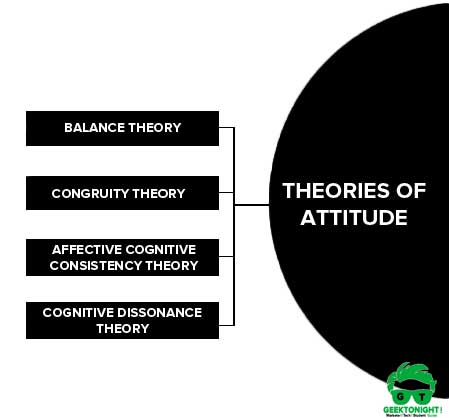
Lets discuss these 4 theories of attitude in brief:
Balance Theory
Balance Theory is concerned with consistency in the judgement of people and or issues that are linked by some form of relationship.
There are three elements:
- Person
- Other person
- Impersonal entity
There are two types of relationship to connect these three types of elements
- The linking relations or sentiments
- The unit relation
Both linking and unit relations are positive or negative towards any object or person or stimuli etc. or these three types of elements.
Congruity Theory
Congruity theory is similar to balance theory. The focus of the theory is on changes in evolution of a source and a concept that are linked by an associative or dissociative assertion.
Congruity exists when a source and concept positively associated have exactly the same evaluation, and when a source and concept that are negatively associated have exactly the opposite evaluation attached to him.
Affective Cognitive Consistency Theory
The theory is also called structural because it is concerned with what happens within the individual when an attitude changes.
It is concerned with the consistency between a person’s overall attitude towards an object or issue and its his beliefs about the relationship.
Cognitive structure means end relationship between the object or issue and the achievement of desired undesired values of goals.
Cognitive Dissonance Theory
It is little-bit similar to affective cognitive theory. The difference between these two is that the stimuli arise from environment in the first one.
This theory tends to tie in the third component of attitude. There are three types of cognitions: 1. Dissonance 2.
Go to Section:
What is Attitude? | Attitude Definition | Attitude Meaning | Components of Attitude | Characteristics of Attitudes | Functions of Attitude | Types of Attitude | Attitude Formation | Importance of Attitude | Theories of Attitude
Reference
- Robbins, Stephen P. 2010. Organizational Behaviour. New Delhi: Prentice-Hall.
- Anderson, M., 2004. The Power of Attitude, Thomas Nelson.
FAQ
Attitude is defined as a more or less stable set of predispositions of opinion, interest or purpose involving expectancy of a certain kind of experience and readiness with an appropriate response.
Personality is the fundamental and foremost determinant of individual behaviour. It seeks to integrate the physiological and psychological facets of an individual to put them into action.
Perception is the process by which a person interpret and organize sensation to produce a meaningful experience of the world.
Learning can be defined as a relatively permanent change in behaviour or potential behaviour as a result of direct or indirect experience. Learning is thus a change in behaviour as a result of experience.
Go On, Share & Help your Friend
Did we miss something in Organizational Behavior Tutorial or You want something More? Come on! Tell us what you think about our post on What is Attitude? | Organisational Behavior in the comments section and Share this post with your friends.
Marketing Management
(Click on Topic to Read)
- What Is Market Segmentation?
- What Is Marketing Mix?
- Marketing Concept
- Marketing Management Process
- What Is Marketing Environment?
- What Is Consumer Behaviour?
- Business Buyer Behaviour
- Demand Forecasting
- 7 Stages Of New Product Development
- Methods Of Pricing
- What Is Public Relations?
- What Is Marketing Management?
- What Is Sales Promotion?
- Types Of Sales Promotion
- Techniques Of Sales Promotion
- What Is Personal Selling?
- What Is Advertising?
- Market Entry Strategy
- What Is Marketing Planning?
- Segmentation Targeting And Positioning
- Brand Building Process
- Kotler Five Product Level Model
- Classification Of Products
- Types Of Logistics
- What Is Consumer Research?
- What Is DAGMAR?
- Consumer Behaviour Models
- What Is Green Marketing?
- What Is Electronic Commerce?
- Agricultural Cooperative Marketing
- What Is Marketing Control?
- What Is Marketing Communication?
- What Is Pricing?
- Models Of Communication
Sales Management
- What is Sales Management?
- Objectives of Sales Management
- Responsibilities and Skills of Sales Manager
- Theories of Personal Selling
- What is Sales Forecasting?
- Methods of Sales Forecasting
- Purpose of Sales Budgeting
- Methods of Sales Budgeting
- Types of Sales Budgeting
- Sales Budgeting Process
- What is Sales Quotas?
- What is Selling by Objectives (SBO)?
- What is Sales Organisation?
- Types of Sales Force Structure
- Recruiting and Selecting Sales Personnel
- Training and Development of Salesforce
- Compensating the Sales Force
- Time and Territory Management
- What Is Logistics?
- What Is Logistics System?
- Technologies in Logistics
- What Is Distribution Management?
- What Is Marketing Intermediaries?
- Conventional Distribution System
- Functions of Distribution Channels
- What is Channel Design?
- Types of Wholesalers and Retailers
- What is Vertical Marketing Systems?
Marketing Essentials
- What is Marketing?
- What is A BCG Matrix?
- 5 M'S Of Advertising
- What is Direct Marketing?
- Marketing Mix For Services
- What Market Intelligence System?
- What is Trade Union?
- What Is International Marketing?
- World Trade Organization (WTO)
- What is International Marketing Research?
- What is Exporting?
- What is Licensing?
- What is Franchising?
- What is Joint Venture?
- What is Turnkey Projects?
- What is Management Contracts?
- What is Foreign Direct Investment?
- Factors That Influence Entry Mode Choice In Foreign Markets
- What is Price Escalations?
- What is Transfer Pricing?
- Integrated Marketing Communication (IMC)
- What is Promotion Mix?
- Factors Affecting Promotion Mix
- Functions & Role Of Advertising
- What is Database Marketing?
- What is Advertising Budget?
- What is Advertising Agency?
- What is Market Intelligence?
- What is Industrial Marketing?
- What is Customer Value
Consumer Behaviour
- What is Consumer Behaviour?
- What Is Personality?
- What Is Perception?
- What Is Learning?
- What Is Attitude?
- What Is Motivation?
- Segmentation Targeting And Positioning
- What Is Consumer Research?
- Consumer Imagery
- Consumer Attitude Formation
- What Is Culture?
- Consumer Decision Making Process
- Consumer Behaviour Models
- Applications of Consumer Behaviour in Marketing
- Motivational Research
- Theoretical Approaches to Study of Consumer Behaviour
- Consumer Involvement
- Consumer Lifestyle
- Theories of Personality
- Outlet Selection
- Organizational Buying Behaviour
- Reference Groups
- Consumer Protection Act, 1986
- Diffusion of Innovation
- Opinion Leaders
Business Communication
- What is Business Communication?
- What is Communication?
- Types of Communication
- 7 C of Communication
- Barriers To Business Communication
- Oral Communication
- Types Of Non Verbal Communication
- What is Written Communication?
- What are Soft Skills?
- Interpersonal vs Intrapersonal communication
- Barriers to Communication
- Importance of Communication Skills
- Listening in Communication
- Causes of Miscommunication
- What is Johari Window?
- What is Presentation?
- Communication Styles
- Channels of Communication
- Hofstede’s Dimensions of Cultural Differences and Benett’s Stages of Intercultural Sensitivity
- Organisational Communication
- Horizontal Communication
- Grapevine Communication
- Downward Communication
- Verbal Communication Skills
- Upward Communication
- Flow of Communication
- What is Emotional Intelligence?
- What is Public Speaking?
- Upward vs Downward Communication
- Internal vs External Communication
- What is Group Discussion?
- What is Interview?
- What is Negotiation?
- What is Digital Communication?
- What is Letter Writing?
- Resume and Covering Letter
- What is Report Writing?
- What is Business Meeting?
- What is Public Relations?
Business Law
- What is Business Law?
- Indian Contract Act 1872
- Essential Elements of a Valid Contract
- Types of Contract
- What is Discharge of Contract?
- Performance of Contract
- Sales of Goods Act 1930
- Goods & Price: Contract of Sale
- Conditions and Warranties
- Doctrine of Caveat Emptor
- Transfer of Property
- Rights of Unpaid Seller
- Negotiable Instruments Act 1881
- Types of Negotiable Instruments
- Types of Endorsement
- What is Promissory Note?
- What is Cheque?
- What is Crossing of Cheque?
- What is Bill of Exchange?
- What is Offer?
- Limited Liability Partnership Act 2008
- Memorandum of Association
- Articles of Association
- What is Director?
- Trade Unions Act, 1926
- Industrial Disputes Act 1947
- Employee State Insurance Act 1948
- Payment of Wages Act 1936
- Payment of Bonus Act 1965
- Labour Law in India
Brand Management
Human Resources Tutorial
(Click on Topic to Read)




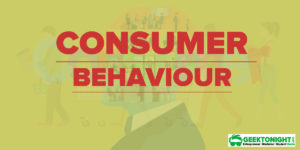
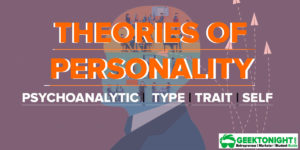




Have really got all that I want and the notes are precise and self explanatory
I m glad you liked it. Thanks
Hi,
Please can i get a book where the issue of attitude is discussed further.
I would like to purchase one.
thanks
Will love to visit this site again